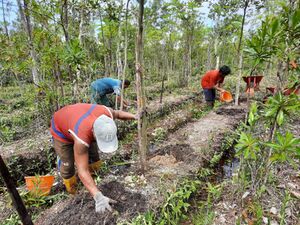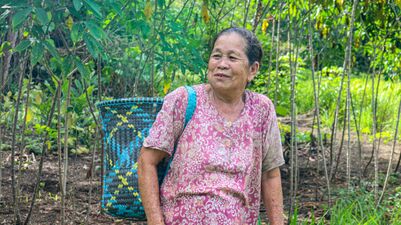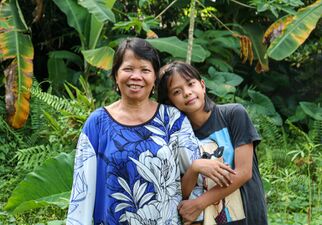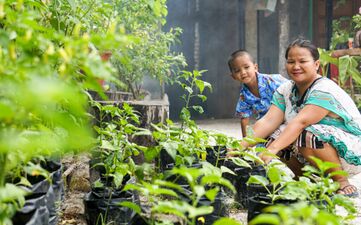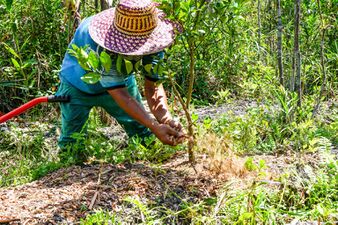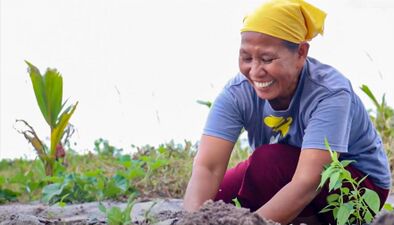Resilience through agroforestry in Kalimantan: Difference between revisions
(Created page with "{{Project |Description=The island of Borneo is home to some of the last tropical forests on the planet. Nested in the Indonesian part of Borneo, Central Kalimantan faces many environmental and social challenges such as slash-and-burn methods, deforestation, poor acid sandy soils and an extensive use of chemicals for farming. Working in Bukit Batu, the project aims to develop and impart agroforestry methods to smallholder farmers to rebuild soil fertility and increase th...") |
(Added geo ID) |
||
| Line 28: | Line 28: | ||
File:pict_large.jpg|Resilience through agroforestry in Kalimantan,File:ph_57663_225093.jpg|,File:ph_57663_225094.jpg|,File:ph_57663_225095.jpg|,File:ph_57663_225096.jpg|,File:ph_57663_225097.jpg| | File:pict_large.jpg|Resilience through agroforestry in Kalimantan,File:ph_57663_225093.jpg|,File:ph_57663_225094.jpg|,File:ph_57663_225095.jpg|,File:ph_57663_225096.jpg|,File:ph_57663_225097.jpg| | ||
]] | ]] | ||
|coordinate=,}} | |coordinate=, | ||
|geo_id=1643084}} | |||
Revision as of 13:24, 18 May 2023
| Organization | Yayasan Usaha Mulia / Foundation for Noble Work |
|---|---|
| Region | Indonesia |
| Website | Website |
| N/A | |
| N/A | |
| ProjectLeader | Vanessa Reksodipoetro |
| Linked Problems & Solutions
|
|---|
The island of Borneo is home to some of the last tropical forests on the planet. Nested in the Indonesian part of Borneo, Central Kalimantan faces many environmental and social challenges such as slash-and-burn methods, deforestation, poor acid sandy soils and an extensive use of chemicals for farming. Working in Bukit Batu, the project aims to develop and impart agroforestry methods to smallholder farmers to rebuild soil fertility and increase their livelihoods.
Challenge
The majority of the population in Bukit Batu lives in poverty. In spite of poor soil conditions, agriculture is a major livelihood. Most of the farmers are transmigrants who have no knowledge of practices fit to the local conditions, so inputs of fertilisers and pesticides are high and conducive to a poor economy and low produce quality. Climate change has resulted in the average temperature increasing, water shortage in the dry season and flooding during the rainy season.
Long-Term Impact
By switching to agroforestry methods, the project will help smallholder farmers not only adapt to climate change, but also boost their household income. Agroforestry will also help to mitigate fires and the traditional slash and burn practice through the increase of permanent ground cover. Additionally, working with women community leaders will enforce their position in the villages and will be a way to campaign the importance of conservation education in the community.
References
- http://www.yumindonesia.org
- https://www.yumindonesia.org/images/uploads/report/WEBSITE_ENGLISH_AR_YUM_2021.pdf
Additional Documentation
https://www.yumindonesia.org/images/uploads/report/WEBSITE_ENGLISH_AR_YUM_2021.pdf
Project Gallery
- Climate Action in Indonesia Projects
- Lack of sustainable agricultural practices leading to deforestation and soil degradation in Kalimantan Projects
- Climate Action in Indonesia Projects in Indonesia
- Lack of sustainable agricultural practices leading to deforestation and soil degradation in Kalimantan Projects in Indonesia
- Project
